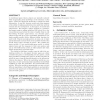4435 search results - page 66 / 887 » Algorithms, games, and the internet |
ATAL
2009
Springer
14 years 4 months ago
2009
Springer
In large systems, it is important for agents to learn to act effectively, but sophisticated multi-agent learning algorithms generally do not scale. An alternative approach is to ï...
SIGECOM
2010
ACM
14 years 2 months ago
2010
ACM
We analyze the complexity of computing pure strategy Nash equilibria (PSNE) in symmetric games with a ï¬xed number of actions. We restrict ourselves to âcompactâ representati...
WWW
2008
ACM
14 years 10 months ago
2008
ACM
All information exchange on the Internet ? whether through full text, controlled vocabularies, ontologies, or other mechanisms ? ultimately requires that that an information provi...
AAAI
2007
14 years 8 days ago
2007
In normal scenarios, computer scientists often consider the number of states in a game to capture the difï¬culty of learning an equilibrium. However, players do not see games in ...
SIGECOM
2006
ACM
14 years 3 months ago
2006
ACM
In traditional game theory, players are typically endowed with exogenously given knowledge of the structure of the gameâeither full omniscient knowledge or partial but ï¬xed in...

